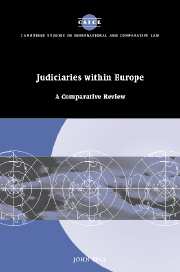Book contents
- Frontmatter
- Contents
- Preface
- List of abbreviations
- 1 Introduction
- 2 The French judiciary
- 3 The German judiciary
- 4 The Spanish judiciary
- 5 The Swedish judiciary
- 6 The English judiciary in comparative perspective
- 7 Factors shaping the character of the judiciary
- Index
- CAMBRIDGE STUDIES IN INTERNATIONAL AND COMPARATIVE LAW
3 - The German judiciary
Published online by Cambridge University Press: 21 July 2009
- Frontmatter
- Contents
- Preface
- List of abbreviations
- 1 Introduction
- 2 The French judiciary
- 3 The German judiciary
- 4 The Spanish judiciary
- 5 The Swedish judiciary
- 6 The English judiciary in comparative perspective
- 7 Factors shaping the character of the judiciary
- Index
- CAMBRIDGE STUDIES IN INTERNATIONAL AND COMPARATIVE LAW
Summary
The culture of the German judiciary was traditionally that of a bureaucratic elite. The modern judiciary operates within a system which has structural similarities to the past, but which has undergone radical change in values. Its place as an elite has to be reviewed in the light of contemporary changes within the legal community.
In the first place, the judiciary was a bureaucratic and moderately creative part of the governing elite. The current model of judicial training was established in the nineteenth century to train officials for the service of the Prussian Crown. It is competitive, rigorous and selective. Despite the unification of Germany in 1871, the legal system and judicial appointments remained predominantly in the different regions (first kingdoms and now Länder), with a limited groups of judges serving the national (federal) courts. Before there was a national civil code, judges had a significant role in establishing the principles of law to be applied or in interpreting the various codes that the different parts of the Empire had enacted before unification. National codes for civil law, criminal law and civil procedure were all enacted before 1900. These different institutional features established as part of the Obrigkeitsstaat, the authoritarian society, have been retained but now serve the fundamentally different values of a liberal democracy that operates in a European context.
- Type
- Chapter
- Information
- Judiciaries within EuropeA Comparative Review, pp. 108 - 173Publisher: Cambridge University PressPrint publication year: 2006

